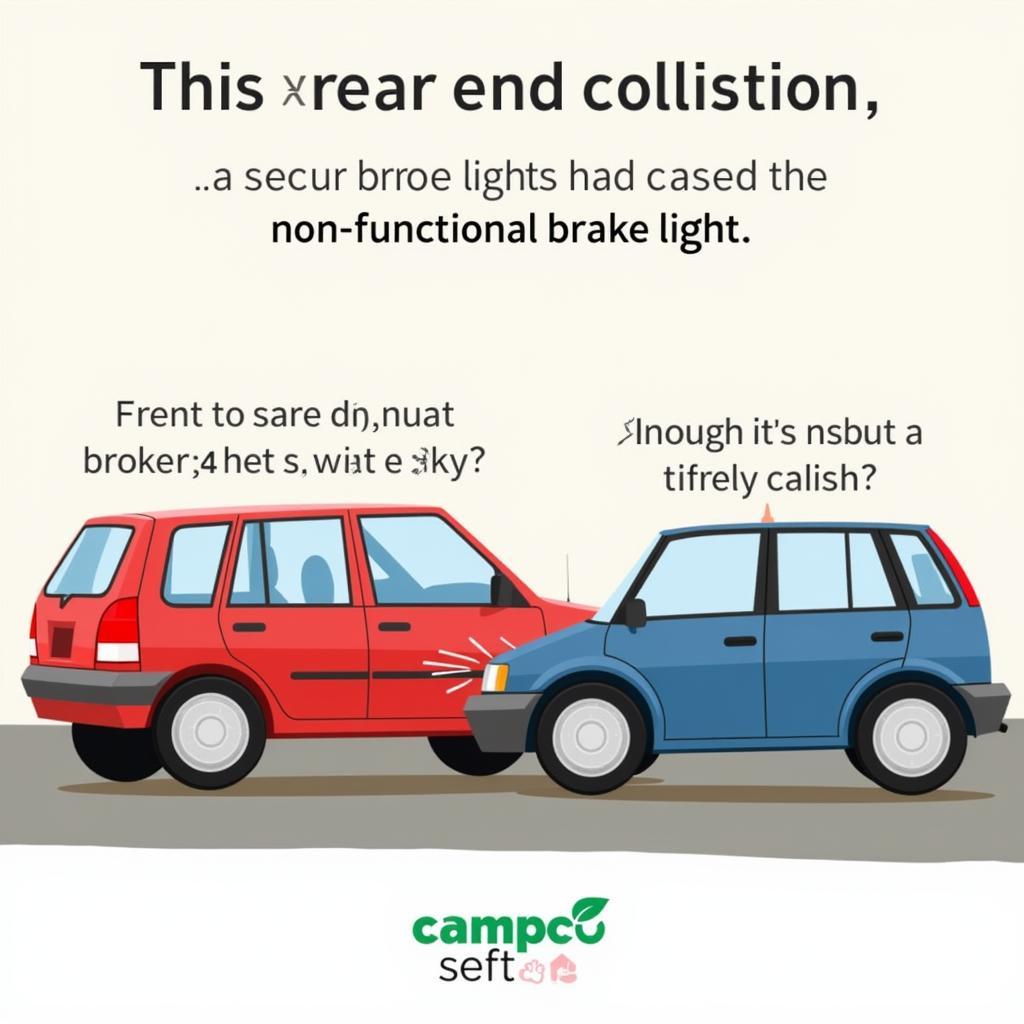Getting pulled over for a brake light warning citation is never fun, but it’s a common traffic violation. It might seem like a minor issue, but a malfunctioning brake light can significantly increase the risk of accidents, especially rear-end collisions. This article delves into the intricacies of brake light warning citations, covering everything from understanding the law and potential consequences to diagnosing and fixing the problem.
Why Brake Lights Matter: More Than Just a Warning
Brake lights are crucial for road safety, acting as a vital communication tool for drivers behind you. They instantly signal your intention to slow down or stop, giving them ample time to react accordingly. Faulty or non-functional brake lights create a dangerous situation, as other drivers may not anticipate your actions, increasing the chances of a collision.
 Faulty Brake Light Leading to Collision
Faulty Brake Light Leading to Collision
Common Causes of Brake Light Malfunctions
Before facing the consequences of a brake light warning citation, understanding what causes these malfunctions can be helpful. Some common culprits include:
- Burnt-out Bulbs: The most common cause, easily identifiable by a dim or completely out light.
- Blown Fuse: A blown fuse in your car’s electrical system can disrupt power to your brake lights.
- Faulty Brake Light Switch: This switch, located behind your brake pedal, can wear out over time, leading to intermittent or complete brake light failure.
- Wiring Problems: Damaged or corroded wires in the brake light circuit can disrupt the flow of electricity.
Understanding the Law and Penalties
Driving with a brake light out is illegal in every state. The severity of the penalty varies depending on the state and specific circumstances, but generally, you can expect:
- Fines: The amount can range from a minor citation to a hefty fine, depending on the jurisdiction.
- Points on Your License: Accumulating points can lead to increased insurance premiums or even license suspension.
- Fix-it Ticket: In some cases, you may receive a fix-it ticket, requiring you to repair the brake light and provide proof of correction within a specific timeframe.
Diagnosing the Problem: DIY or Seek Professional Help?
If you suspect a brake light issue, it’s crucial to diagnose the problem promptly. Simple checks like visually inspecting the bulbs or consulting your car’s manual to locate the fuse box are a good starting point.
However, if you’re not comfortable dealing with electrical components or suspect a more complex issue, seeking help from a qualified mechanic is recommended. Modern vehicles are increasingly reliant on sophisticated electrical systems, and a misdiagnosis can potentially lead to more significant problems.
Addressing a Brake Light Warning Citation
Receiving a brake light warning citation can be stressful, but handling it responsibly is crucial. Here’s what you should do:
- Stay Calm and Be Cooperative: Being polite and respectful with the officer can go a long way.
- Review the Citation Carefully: Ensure all information is correct and you understand the required action and deadline.
- Repair the Brake Light Promptly: Address the issue immediately to avoid further penalties or complications.
- Provide Proof of Correction: If you received a fix-it ticket, ensure you provide the necessary documentation to the relevant authorities within the specified timeframe.
Brake Light Warning Citation: A Final Word
A brake light warning citation, though inconvenient, serves as a crucial reminder of your responsibility as a driver to maintain a safe vehicle. Addressing the issue promptly ensures your safety and the safety of others on the road. Regular vehicle maintenance, including checking your lights, can go a long way in preventing such citations and, more importantly, avoiding accidents.
FAQ
1. Can I fight a brake light warning citation?
While challenging a citation is possible, the chances of success depend on the specific circumstances and evidence. If you believe you were wrongly cited, consult with a legal professional to discuss your options.
2. How much does it cost to fix a brake light?
The cost varies depending on the cause and complexity of the issue. A simple bulb replacement is relatively inexpensive, while a faulty brake light switch or wiring problem can be more costly.
3. How often should I check my brake lights?
It’s recommended to check your brake lights at least once a month or any time you notice a change in their brightness.
4. Can I drive with a brake light out temporarily?
No, driving with a brake light out is illegal. Even for a short period, it significantly increases the risk of accidents and can result in further penalties.
5. Do I need a mechanic to replace a brake light bulb?
Replacing a brake light bulb is a relatively simple task that many car owners can do themselves. Consult your car’s manual for specific instructions. However, if you’re uncomfortable working with electrical components, seeking professional help is recommended.
